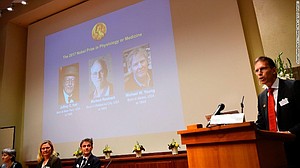10/3/2017

By Angela Dewan, CNN
(CNN) -- The 2017 Nobel Prize for Physics has been awarded to Rainer Weiss, Barry C. Barish and Kip S. Thorne for their work in detecting gravitational waves.
The three American scientists "made decisive contributions to the LIGO detector," an observatory instrument that detects the waves.
The strongest gravitational waves are produced by catastrophic events, such as colliding black holes, and the LIGO detector is essentially a "black hole telescope," allowing scientists to "see" what was previously invisible.
"On 14 September 2015, the universe's gravitational waves were observed for the very first time. The waves, which were predicted by Albert Einstein a hundred years ago, came from a collision between two black holes. It took 1.3 billion years for the waves to arrive at the LIGO detector in the USA," the Nobel committee wrote in a press release.
"The signal was extremely weak when it reached Earth, but is already promising a revolution in astrophysics. Gravitational waves are an entirely new way of observing the most violent events in space and testing the limits of our knowledge."
Gravitational waves are "ripples" in the fabric of space and time caused by some of the most violent and energetic processes in the universe, according to the California Institute of Technology (Caltech).
Physically observing the waves for the first time with LIGO has proved Einstein's belief in their existence, as he spelled out in 1916 in his theory of relativity.
The award was given half to Weiss from the Massachusetts Institute of Technology and the other half jointly to Barish and Thorne from Caltech.
